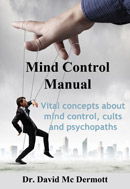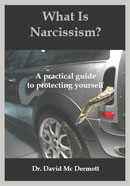Do Psychopaths Know Right
From Wrong?
'Do psychopaths know right from wrong?' is a question that has been asked by psychiatrists and sociologists as far back as the eighteenth century. At that time they were puzzled by and studying a group of people who seemed to be able to easily choose to do bad or evil things and not be bothered by doing so.
These people, even though they may have already been caught and punished for doing 'wrong', continued to engage in the same illegal, morally wrong or unethical behaviors. It was originally thought that they were unable to learn from their mistakes.
Terms such as 'morally insanity', 'moral imbecile' and 'morally irresponsible' were used. It caused problems for some time because when these types were found guilty of crimes, the legal system was unsure if they should be incarcerated or sent to asylums for mental health treatment.
Do psychopaths know right from wrong?
Fast forward to today and the legal systems in most countries have no such problem. It is widely accepted that psychopaths are fully responsible for their actions. Unlike psychotics, for example, who are not held responsible for their actions on the grounds of insanity, psychopaths are not considered insane. They have a personality disorder, not a mental health issue. If convicted of a crime they go to jail, not a mental institution.
Let's examine what we know about them.
Do psychopaths know right from wrong? Their behavior patterns
Psychopaths are known for tricking their victims at the start of the relationship into thinking that they are wonderful people. Only when the victim is 'caught' does the bad behavior kick in. This controlling, cruel aspect is hidden from potential victims initially. This is done intentionally.
Another common characteristic is that the psychopath will have a public persona for those outside the house while abusing their spouse behind closed doors. The abusive nature is hidden, again deliberately, from outsiders in order not to tarnish the psychopath's reputation. The psychopath does not mix these things up. He or she understands very clearly which behaviors are acceptable in polite society and which are not.
You can read more details about how specifically these things work in this article about sociopaths.
So they know what is right and wrong for themselves and they know how the rules about right and wrong work in general. They know them well enough, in fact, that can use them to predict and control the behavior of their victims. Let's look at a few examples.
Robert Cialdini lists reciprocity as one of the weapons of influence. Reciprocity is the idea that if someone does you a favor, you will feel obliged to return the favor at some point in the future. In most cultures in the world the children learn how this works until it basically becomes automatic. We use this idea because it is useful to keep the wheels of society turning, so to speak. We learn that it is the right and proper thing to do to help someone out if they have helped us in the past.
Psychopaths learn about this, too, of course, but they not only use it, they exploit it. For example, they may do something for their victim and then tell that person that they have done them a favor. This builds a sense of debt or obligation in the victim. They feel that they owe the manipulator and when the manipulator comes to collect, it's very difficult for the victim to say no, even though the victim never asked for a favor in the first place! The psychopath recognizes this and has no trouble taking advantage of the victim anyway.
The psychopath will also do a small favor and expect a huge one in return. The cult leader who lends someone a book and then expects sexual favors in return, for example, or a psychopath who gives his girlfriend money to buy lunch but then expects that she will pay hundreds towards his monthly car payment when he claims he doesn't have the money.
The psychopath will also do a favor once and expect to be paid back for it over and over again. Examples might be a manipulator who helped with some paperwork for a work project years ago but expects that the victim will do their taxes every year for decades, or a psychopath who vacuumed one day 6 months ago and expects that their wife will do it for the rest of the year.
The psychopath has no problem letting the victim know that there is a debt. "I have been very generous, giving, kind. Now it's your turn..." is a very common message. Keep in mind that because of the psychopathic nature, the manipulator has zero sense of responsibility or obligation in returning a favor if someone does them a favor! This is significant. They have no sense of having to return a favor, but they understand perfectly that other people feel obliged to do so. The psychopath also understands that they feel this way because it's the right thing to do! They will guilt and shame people into returning favors because they recognize that people are driven to do the right thing.
Do psychopaths know right from wrong? Rules
Societies have rules and regulations for obvious reasons. Following the rules means people do the right things and avoid doing the wrong things. The psychopaths understand this, too, and will use it to leverage people into behaving in certain ways.
A common situation in divorce cases is where the psychopath will threaten legal action against the victim. The threat of going to court and being found to be 'wrong' and breaking the law is frightening for most people and absolutely terrifying for victims who have a pseudopersonality. The fear of being dragged into court is often enough to get the victim to do what the psychopath wants no matter how absurd the situation might be. For example, the psychopath threatens to sue because the victim took the garden furniture out of the house without asking permission. The victim may just return the furniture to avoid being sued even though the chances of the psychopath getting into court with such a trivial complaint while the divorce is pending is close to zero. The psychopath, however, recognizes the need of the normal, feeling person to avoid being punished for doing 'wrong' and plays on this fear.
In cults there are very rigid rules and standards. The members are told that they can choose A or B, but A would mean that they are going against the rules and that the leader would obviously be very displeased. In order to avoid being seen as rule breakers, the members choose the 'right' option, B, which is what the leader wants in the first place. In this way, the psychopath uses right and wrong to manipulate the behavior of the members. Note, too, that in this case the leader even set up which option was right and which one was wrong.
What do the psychopaths themselves think?
There are situations where psychopaths themselves will explain what way they think. Prisoners who are proud of their crimes will often talk about themselves openly. Online forums are also another interesting source of information and, of course, there are books written by formally diagnosed or self confessed psychopaths.
When asked 'do psychopaths know right from wrong?' they ore usually very clear that they do indeed know the difference. They will even explain how they take advantage of other people's weakness of having to follow the rules. Having to 'do the right thing' is considered a limitation by the psychopath, one that they are happy to exploit.
The psychopaths will often explain how they only follow their own rules and this often contributes to their sense of superiority.
Do psychopaths know right from wrong? Academic studies
It is commonly accepted that moral judgments are influenced by reasoning, intuition and emotions but the interaction between the three in making moral judgments is unclear. It was thought that emotional processing was necessary in the process of making such judgments.
A study published in Social Cognitive and Affective Neuroscience in 2010 set out to answer the question 'do psychopaths know right from wrong?' but with a different hypothesis to the usual one. They wondered if the psychopath did understand the difference but had abnormal regulation of immoral behavior.
They studied psychopaths, non-psychopathic delinquents and normal subjects. They asked them to make judgments about moral dilemmas involving situations of personal harm (physical contact involved) and impersonal harm (no physical contact or injury).
Their findings showed that all groups thought that situations of impersonal harm were more permissible than situations of personal harm. Even though psychopaths have diminished emotional processing (and different behaviors from the normal group), there was no difference between the groups in the moral judgments made about either the personal or impersonal situations. And even though the psychopaths had different scores on the Hare Psychopath Checklist - Revised and the nature of their crimes were different, these factors were not correlated to their moral judgments.
Somehow, psychopaths were able to make moral judgments that were equivalent to those of delinquents or normal people, despite their emotional differences. This suggests that the psychopaths do know the difference between right and wrong.
The authors suggest that the abnormal emotional processing may be significant in the value they place on such judgments and in deciding on behaviors. In other words, the psychopath doesn't care if it's morally right or wrong when it comes to their behavior.
Other studies have also confirmed that psychopaths do know right from wrong.
So how do we explain the moral irresponsibility mentioned above. Why do psychopaths do bad or wrong things even when they have been punished for it? It is thought that they do not concern themselves about future consequences but are much more interested in instant gratification. They know they are doing wrong, they know there will be consequences if caught, they just don't care. They want immediate gratification and they want it now! This explains why it seems like they are not learning or that they are stupid in some way, but this is usually not the case.
Do psychopaths know right from wrong? More reading
There are more ideas on this topic in this article on sociopaths.
You can learn more about the characteristics of psychopaths, things manipulative people say, controlling husbands, controlling wives, toxic families and recovery from a psychopathic relationship.
Like this page?
Consultations
Would you like to talk to someone about your situation?
If you think you are or have been in a cult or a destructive relationship, or a friend or family member might be in a cult and you want to talk to someone, send me a message on the Contact page and we can arrange to talk. All communication will be treated in the strictest confidence.
Available now!

54 Practical Tips For Dealing With Psychopaths and Narcissists
You have the theory but how do you actually apply it? This book spells it out...
Mind Control Manual

Vital concepts about mind control, cults
and psychopaths
Do you think that you might be in an abusive relationship? Are you realizing that the group you are in may be a cult?
What Is Narcissism?

A practical guide to protecting yourself
Do you think you are being taken advantage of emotionally, physically, sexually or financially in your relationship? Do you want to leave but you can't seem to get away?
Tips for dealing with psychopaths and narcissists
Fortnightly newsletter with practical tips and ideasLearn more...
Plus!
'7 Vital Do's and Don'ts of Decision Making' when you subscribe!